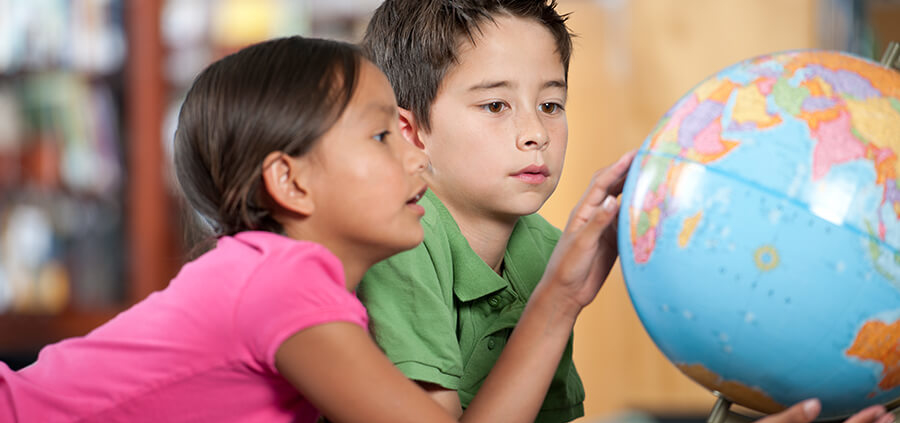Why your child should learn a second language
Ever since the 1990s was declared by presidential resolution the “decade of the brain”, many researchers have studied the brain of bilingual children. They discovered a lot about the impact of bilingualism and multilingualism in promoting cognitive development. It has been found that the brain of bilingual and multilingual children works differently than the brain of monolingual children. These differences provide several advantages to children that speak more than one language. Here are 10 reasons why your child should learn a second language:
1. Learning a Second Language Boosts brain power
Some of the cognitive advantages of learning a second language may have to do with the fact that the brain of bilingual and multilingual children develops more densely, as found by researchers analyzing the brain densities of bilingual people. In a study conducted using brain imaging, Andrea Mechelli of London’s Wellcome Department of Imaging Neuroscience and her colleagues (which included experts from the Fondazione Santa Lucia in Rome) found that bilingual speakers had denser gray matter compared to monolingual study participants.
2. Better problem-solving and other cognitive abilities
Children that speak more than one language learn to negotiate meaning as a crucial part of communicating in more than one language system. This also helps them with problem-solving tasks, and gives children the ability to seek different approaches to solve a problem. Research shows that there is a relation between bilingualism and several abilities, including the ability to think abstractly about language and think nonverbally.
3. Children develop an “ear” for languages
Exposing children to a foreign or second language at an early age helps them develop an “ear” for the language and achieve better pronunciation and fluency later in life. This is due to the fact that, when learning a foreign language, children must distinguish meaning from very discrete sounds. According to some studies, children who learn a second or foreign language before teenage years are more likely to achieve native-like pronunciation.
4. Bilingual Child Achieve Higher academic achievement and test scores
Studies have shown that learning a foreign language early in life improves cognitive abilities and influences achievement in other areas. It can result in higher test scores in reading and math. Studies have found that students that speak more than one language score higher on standardized college admission exams than monolingual students. According to Kathleen Marcos, “the College Entrance Examination Board reported that students who had averaged four or more years of foreign language study scored higher on the verbal section of the Scholastic Aptitude Test (SAT) than those who had studied four or more years of any other subject (Marcos, 1998).
Read more (American Council on the Teaching of Foreign Languages – ACTFL)
Read more (Center for Applied Linguistics – CAL)
5. Gives students a head start in language requirements for college
Are you one of those people who studied a foreign language for 4 years during high school but can’t seem to ask for basic directions? Let alone think of having a meaningful conversation in the language even after all the hours you’ve put into it? If you are, you are not alone. Children that learn a language at an early age have a huge head start both cognitively and linguistically. It will help them “breeze” through foreign language classes in high school and college, giving them a chance of truly becoming bilingual.
6. Children Who Learn a Second Language Have Increased Empathy
A study from the University of Chicago studied children that speak more than one language. They found that these children are better at “putting themselves in other people’s shoes” and understanding different perspectives. To speak another language requires not only language skills, but also the ability to understand the other speaker’s perspective.
7. Increased children’s understanding of his or her native language
Many studies suggest that second language study helps enhance English language skills. Learning another language helps students learn about how language works in general. These children become more aware of their own first language (grammar, conjugations, sentence structures, etc.) Studies have found that bilingual children understand better than monolingual students the visual representation of print materials. According to Kathleen Marcos, “Numerous other studies have also shown a positive relationship between foreign language study and English language arts achievement.”
Read more (Center for Applied Linguistics – CAL)
Read more (Telegraph article)
8. Better understanding of other cultures and connecting with people that speak other languages
Bilingualism allows for cross-cultural communication. Children who speak more than one language have the opportunity to become more culturally aware and have the ability to better understand and appreciate cultural differences, which helps them be more open to different ways of thinking and allows them to experience the world with “new eyes”. Bilingual children have the opportunity to connect with people that speak other languages and have access to more resources from other countries.
9. Better career opportunities
In today’s global world, the ability to communicate in more than one language is increasingly becoming an essential skill. When applying for a job, bilingual candidates have an edge to differentiate themselves from other candidates, and are able to showcase themselves as a valuable potential employees bringing skills that may be invaluable for employers. As James Doherty with WinterWyman Contract Staffing puts it: “If you are in a pool with 10 other corporate recruiters and your collective skills are similar, knowing a foreign language can be the unique talent that gets you that coveted first interview.”
Read more (Penn State University)
Read more (Winter Wyman Human Resources)
10. Makes the world a better place for our children
In our increasingly diverse society, people from different countries and cultures must develop tools to communicate effectively with each other. As put by Kathleen Marcos, “Society as a whole also profits economically, politically, and socially when its citizens can communicate with and appreciate people from other countries and cultures.” A world in which different cultures and languages are valued and appreciated, with open, aware and empathetic people, is a better world for our children.
By Vanessa Simpson, M.Ed.
vanessa@languagekids.com

Founder and Director of Education at Language Kids.
M. Ed.



Hi, I am interested for any children language programs you are offering, such us mandarin, japanese, and french.
I love JAPANESE !
same
I loved reading this and I now have a different perspective on learning another language.
Hi Jo, I am so glad to hear that this article helped you. You just made my day!
This is a very helpful website.THANK YOU!!!!!
This is a great source of information THANK YOU!!!!
Thank you!
I love what you guys are up too. This kind of clever work and coverage!
Keep up the fantastic works guys I’ve included you guys to my own blogroll.
This is a great source of information THANK YOU!!!!
Thank You!
This has helped me write an essay on this topic.
Whenever I have L.O.T.E at school, the question ‘why must we learn another language’ always bothers me. This website helped me understand a lot.
Thanks…
Thank you!
Thank You!
This has helped me write an essay on this topic.
Whenever I have L.O.T.E at school, the question ‘why must we learn another language’ always bothers me. This website helped me understand a lot.
…
Thank you so much!
This is a great source of information THANK YOU!!!!
Bonjour, ton blog est très réussi ! Je te dis bravo ! C’est du beau boulot !:) Ingeberg Finley Blasien
wow nice post
i loved reading it
Makes sense